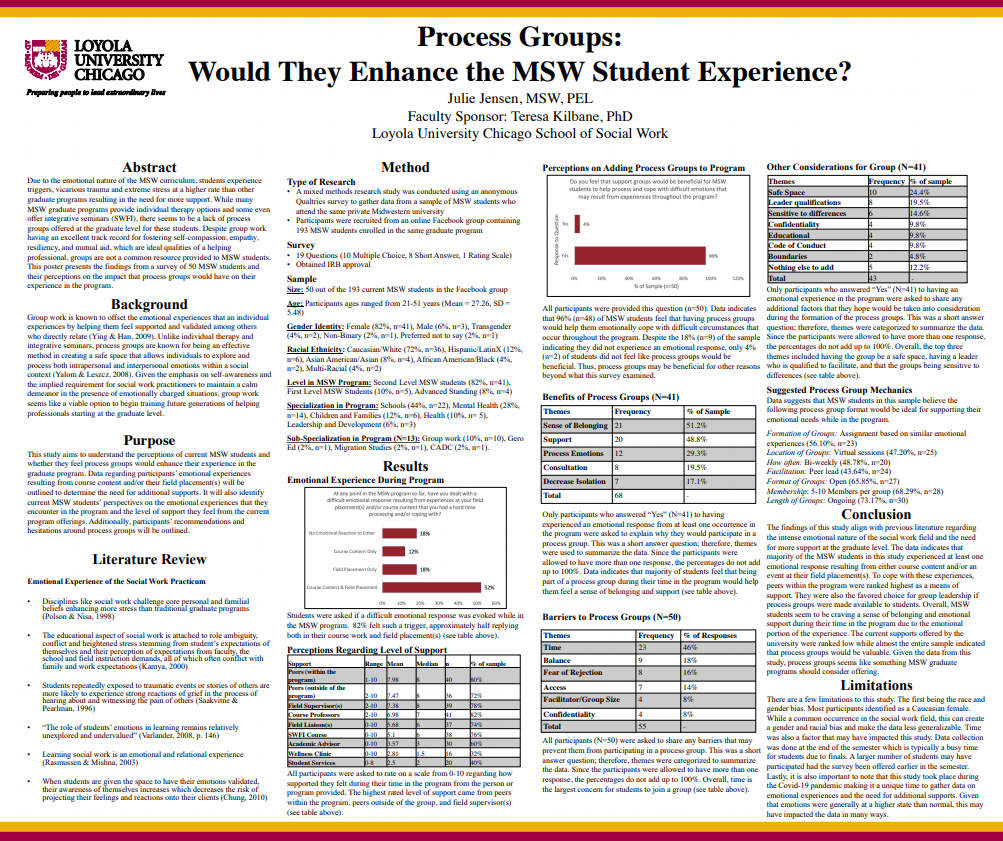Julie Jensen, Loyola University Chicago, Chicago, IL (USA)
Due to the emotional nature of the MSW curriculum, students experience triggers, vicarious trauma and extreme stress at a higher rate than other programs resulting in the need for more support. Individual therapy and integrative seminars are commonly provided; however, process groups are rarely offered. This poster presents the findings from a survey of MSW students and the impact they feel process groups would have on their experience.

View PDF of Poster. View Handout.
Presentation Description:
Research demonstrates a correlation between choosing a career in social work and having adverse childhood experiences (Rompf & Royse, 1994). These experiences enhance the likelihood that MSW students will experience triggers, vicarious trauma, compassion fatigue, and/or extreme stress from topics covered throughout the curriculum and incidents that they may be exposed to during field placements (Black, Jeffreys, & Hartley, 2014; Hiles Howard et al., 2015). These negative effects are seen at an increased rate when there is a lack of support offered, or students do not feel equipped with effective self-care strategies to cope with the intense nature of the work (Newsom & Gruszka, 2012). While many graduate programs provide individual therapy options and some even offer integrative seminars, there seems to be a lack of process groups offered despite their ability to foster self-compassion, empathy, resiliency, and mutual aid. Group work is known to offset the emotional experiences that can occur in MSW programs and help an individual feel supported (Ying & Han, 2009). Unlike individual therapy and integrative seminars, process groups are an effective method for creating a safe space that allows individuals to explore and process their intrapersonal emotions within a social context and gain support from members who directly relate (Yalom & Leszcz, 2008). Given the emphasis on self-awareness in social work and the need to form and maintain compassionate connections with others, group work offered at the graduate level seems like a viable option to begin training future generations of helping professionals. This poster aims to (1) present a literature review regarding what is currently being offered to support MSW students and ways that process groups can support students as they encounter triggering course content and unsettling experiences at their field placements, (2) discuss the findings of an anonymous survey presented to first and second-level MSW students enrolled in a 2-year program at a private Midwestern university, (3) identify current MSW students’ perspectives on the emotional experiences that they may be encountering and the level of support that they feel from their current program, and (4) describe the potential benefits and limitations of the current research, as well as suggestions for future research in this area.
References:
- Black, P. N., Jeffreys, D., & Hartley, E. K. (1993). Personal History of Psychosocial Trauma in the Early Life of Social Work and Business Students. Journal of Social Work Education, 29(2), 171–180. https://doi.org/10.1080/10437797.1993.10778812
- Hiles Howard, A. R., Parris, S., Hall, J. S., Call, C. D., Razuri, E. B., Purvis, K. B., & Cross, D. R. (2015). An examination of relationships between 56 professional quality of life, adverse childhood experiences, resilience, and work environment in a sample of human service providers. Children and Youth Services Review, 57, 141-148. https://doiorg.libproxy.lib.csusb.edu/10.1016/j.childyouth.2015.08.003
- Newsome, S., Waldo, M., & Gruszka, C. (2012). Mindfulness Group Work: Preventing Stress and Increasing Self-Compassion Among Helping Professionals in Training. The Journal for Specialists in Group Work, 37(4), 297–311. https://doi.org/10.1080/01933922.2012.690832
- Rompf, E. L., & Royse, D. (1994). Choice of social work as a career: Possible influences. Journal of Social Work Education, 30(2), 163-171.
- Yalom, I. D., & Leszcz, M. (2008). Theory and Practice of Group Psychotherapy, Fifth Edition. Basic Books. http://ebookcentral.proquest.com/lib/luc/detail.action?docID=900424
- Ying, Y., & Han, M. (2009). Stress and Coping with a Professional Challenge in Entering Masters of Social Work Students: The Role of Self‐Compassion. Journal of Religion & Spirituality in Social Work: Social Thought, 28(3), 263–283. https://doi.org/10.1080/15426430903070210

